Denver police say DRONES will respond to 911 calls instead of cops after city defunded the force by millions
The Denver Police Department has launched a new program where drones respond to 911 calls instead of police.
The law enforcement agency that was recently defunded by millions to pay for migrants is now launching its own drone program, along with other police departments in Colorado.
Robert White, the former chief of the Denver Police Department, initially disagreed with the use of drones in 2013, and in 2018 the agency’s only drone was shelved.
Now the department plans to use a $100,000 grant from the Denver Police Foundation to start the program. The Denver Police Department plans to use that money to purchase several drones and begin their drone program within six to 12 months.
Phil Gonshak, director of the department’s Strategic Initiatives Bureau, said The Denver Post: ‘It’s starting to get going.’
The Denver Police Department has launched a new program where drones respond to 911 calls instead of police. The agency plans to deploy them within six to 12 months
“The long-term scope of what we’re trying to do is drones as first responders,” he added.
“Basically, having stations on top of each of our districts so that we can respond with drones to critical needs or emergencies that arise anywhere in the city.”
The Arapahoe County Sheriff’s Office, based in Centennial, Colorado, has been using the robotic flying devices since 2017.
“This really is the future of law enforcement at some point, whether we like it or not,” said Sgt. Jeremiah Gates, who heads the drone unit at the Arapahoe County Sheriff’s Office, said.
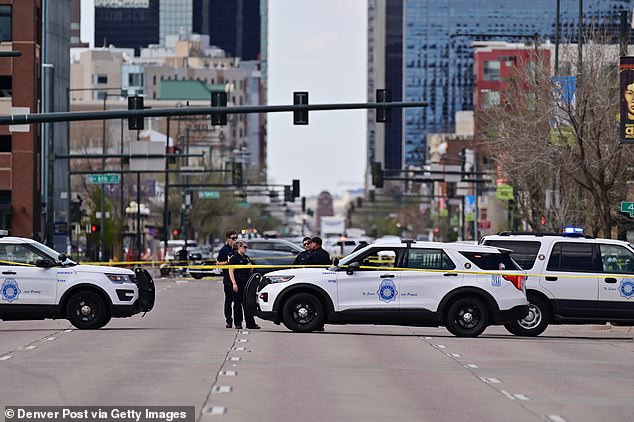
Robert White, a former member of the Denver Police Department, initially disagreed with the use of drones in 2013, and in 2018 the agency’s only drone was shelved
The Arapahoe County Sheriff’s Office has 14 pilots who have used 20 drones to perform tasks including tracking fleeing suspects, searching for missing people, providing overhead surveillance during SWAT operations and mapping crash or crime scenes.
Gates said the department is now considering using its drones to respond before officers and in some cases, instead of them being there at all.
If a drone is deployed before an officer responds to a call, it can map the area and send live-streamed video back to the officer before he arrives.
In the event that a drone is flown to the scene of a 911 call, the device can determine the severity of the call to inform officers if they need to respond.
“I could fly the drone over (a reported suspicious vehicle) and say, ‘Hey, that vehicle isn’t out of place,’ and I never had to send an officer to bother them, and that could clear it up,” says Gates said. ‘It saves resources.’
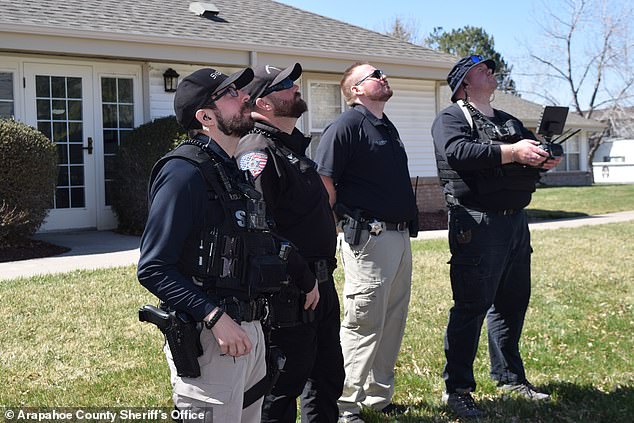
The Arapahoe County Sheriff’s Office, based in Centennial, Colorado, has been using the robotic flying devices since 2017. (Photo: Officers testing a drone)
The Arapahoe County Sheriff’s Office is still in the “very early stages” as they must consider costs, public opinion and determine what type of equipment will be needed to operate the drones for emergency calls.
Gates said the flying devices could also be used to respond to traffic light malfunctions by sending a live video to officers.
He added that the remote devices would reach the emergency scene faster than an officer because they would not have to deal with traffic congestion in the area.
Gates told The Denver Post, “What if we get a call about someone with a gun, and the drone is able to get over our heads and see that it’s not a gun before the police ever contact them?”
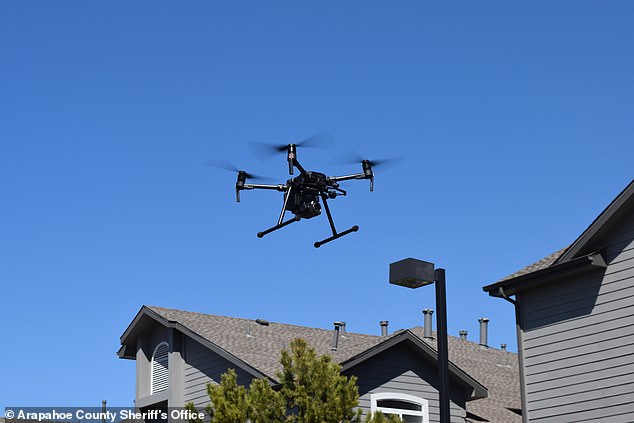
The Arapahoe County Sheriff’s Office has 14 pilots who have used 20 drones to perform tasks including tracking fleeing suspects, searching for missing people and providing overhead surveillance during SWAT operations
While Gates favors the use of drones, Laura Moraff, staff attorney for the American Civil Liberties Union of Colorado, worries that law enforcement agencies using drones could affect people’s rights.
“We’re concerned about what it would mean if drones were truly everywhere in the skies in Colorado,” Moraff said.
“We worry about what that would mean for First Amendment activities, for speech, for organizing and protesting – because law enforcement surveillance, including drones, could change the way people speak and protest.”
Moraff also expressed concern that the use of drones could lead to “more over-policing.”
“We know there is a problem when people report black people doing normal everyday things as if there is something suspicious going on,” she said.
“So sending out a drone every time there is a 911 call could be dangerous and lead to more over-policing of communities of color.
‘There’s also just the risk that the more we normalize having drones in the air, the more it could affect behavior on a large scale, if we just look up and see drones everywhere, knowing the police are watching. us.’
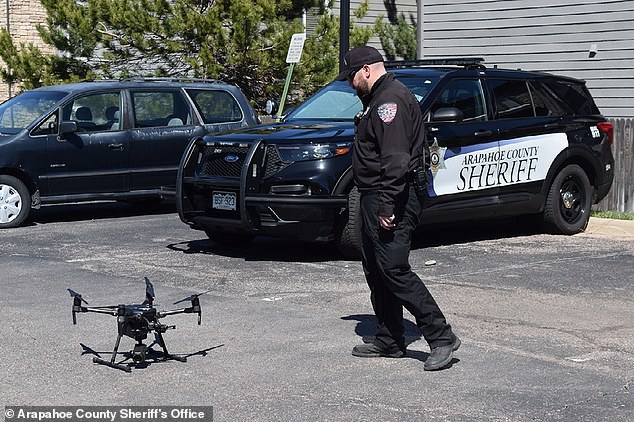
Sergeant Jeremiah Gates said the remote devices would reach the emergency scene faster than an officer because they would not have to deal with traffic congestion in the area
Meanwhile, Littleton police only use drones “proactively during large public events to monitor certain areas,” spokeswoman Sheera Poelman said.
Loveland police used a drone to deliver a defibrillator to a patient before paramedics and authorities could respond, says Sgt. said Bryan Bartnes.
“One disadvantage of it, of course, is that the citizen on site has to put it on and put it on,” Bartnes said. ‘Drones don’t do that yet.’
The largest drone the Loveland Police Department has can carry up to 16 pounds, Bartnes explained.
Ben Birdsell, the community services supervisor for the Commerce Police Department, said the agency plans to launch drones for 911 calls within a year.
“What we’re looking at is that it’s basically a lot cheaper than an officer,” he said.
Drones must be flown at a limited range because they must operate within the pilot’s line of sight and follow Federal Aviation Administration regulations regarding flight.
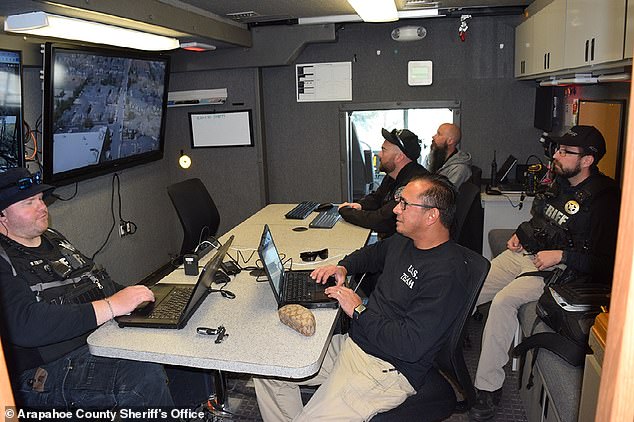
Drones are flown at a limited range because they must operate in line with the pilot’s location and follow Federal Aviation Administration regulations regarding flights. (photo: Arapahoe County Sheriff’s Office tests use of drone in law enforcement)
White said starting a drone program for the Denver Police Department would cost about $1.5 million to $2 million.
“We would never simply replace the call for help with police officers,” he said.
“The DPD would respond to any call for service where someone physically requests a police officer on the scene. “But if there was a fight at Colfax and Cherokee and we put a drone in the air and there’s no fight and nothing causing traffic problems, we would divert our police officers to other emergency calls.”
The department already has a “Drones as a First Responder Program” policy in place and employs several trained pilots.
Denver Police Department spokesman Doug Schepman said the agency’s SWAT team uses a single drone for limited indoor searches and, once approved, can use it for emergency response.
“So there’s no question about what we’re doing, because I know there’s concern about us flying drones and peering through windows without search warrants,” Gonshak said.
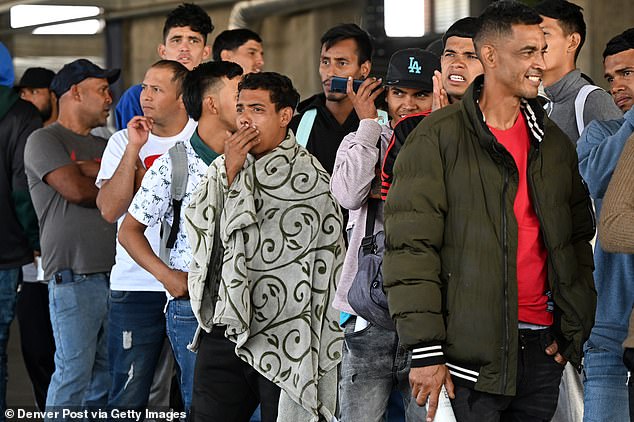
In April, the Denver City Council’s Finance and Governance Committee approved plans to defund the police as the ongoing migrant crisis has cost the city about $89.9 million.
‘We want to be very public-conscious in our efforts.’
In April, the Denver City Council’s Finance and Governance Committee approved plans to defund the police as the ongoing migrant crisis has cost the Democrat-led city about $89.9 million.
The Finance Commission found that $41 million in cuts to multiple city departments is needed to house migrants. KDVR reported.
Following the decision, the department faced cuts of $8.4 million, including the sheriff’s office losing $3.8 million and the fire department losing $2.4 million.
The sanctuary city’s progressive mayor, Mike Johnston, unveiled the budget proposal, allocating $89.9 million to help incoming undocumented immigrants, whom he called “newcomers.”
